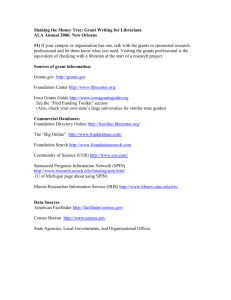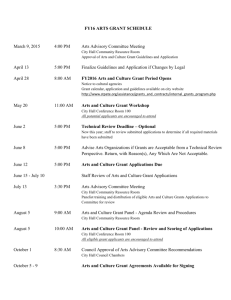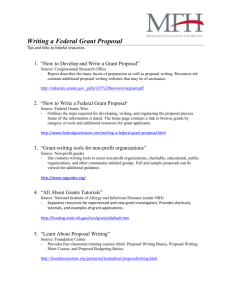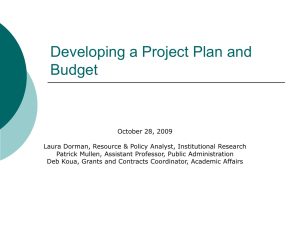How to Find Funding Opportunities
advertisement
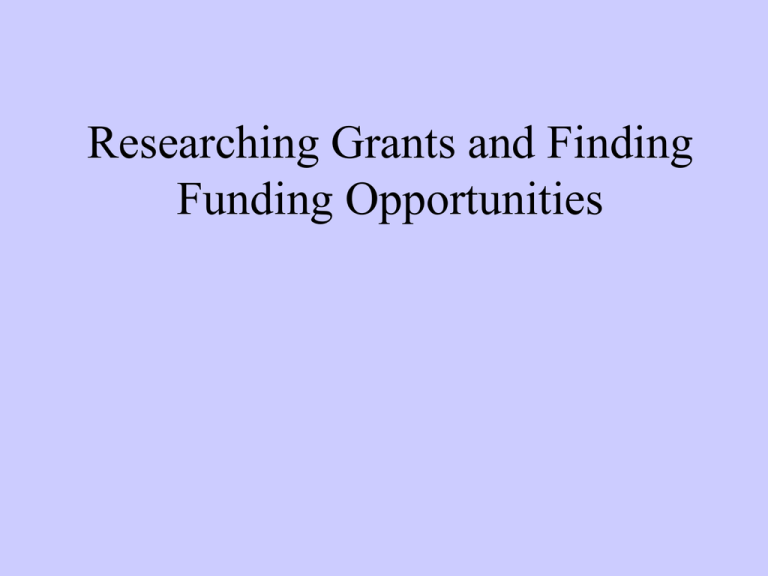
Researching Grants and Finding Funding Opportunities Three truths of funding 1. There is money available 2. But there is more competition for those funds than ever before 3. Researching funding opportunities is critical to grant writing success Who gives grants? Federal and State Agencies Foundations Corporations Federal and State Agencies Local Government Grants: • City and county governments receive monies through block grants • Grants tend to be small and allocated annually • Contact your local city or county planning departments to identify these grants State Government Grants: • May be simple to moderately complex to apply (easier than Federal) • Typically distribute smaller awards for one-year funding • Most state agencies list grant opportunities on their web pages Federal Government Grants: • Are the most complex, competitive and lengthy type of proposal • Offer larger awards and fund for multiple years Foundation Grants Independent Foundation • Established to aid social, educational, or charitable activity; Endowed by a single source (individual or family); Decisions by donor, board, or trust officer; Discretionary giving, usually limited to local area Community Foundation • Publicly-supported organization making grants for charitable purposes in a geographic area; Contributions from many donors (tax-deductible benefit); Decisions by board representing diversity of community Company-Sponsored Foundation • Endowed by a profit-making corporation; decision by board (often company officials); Giving related to corporate activities or communities where corporation operates The Foundation Center: http://foundationcenter.org/ (foundation finder or use library in Manhattan on Fifth Ave.) Guide Star: http://www.guidestar.org Corporations Corporations are interested in: • • • • Creating public awareness Promoting their products and increasing profits Assisting employees (and their families) Training the future workforce Corporations: • Donate via Corporate-Giving Programs and CompanySponsored Foundation • May be national, regional, state, or local in scope • Donate cash, products, and or/manpower Locating funding sources • Starts with an idea of a project that you are passionate about • Does not start with a sponsor • Is not fundraising for a specific item Fundraising is…. • Solicitation from individual and corporate donors • Usually done on a one-time basis • Often an aggressive, short-term marketing program • Focused on operations or general operating expenses • Sometimes focused on helping a specific, target population Successful grant ideas… • Prevent or reduce a community problem or researches a major issue facing society • Always help a targeted population • Attack problems through creative, innovative programs or services • Result in gaining knowledge about how to prevent & reduce a problem • Disseminate the new knowledge to others • Are easily replicated You need a sponsor who.. • • • • Considers the problem as a priority Funds comparable projects Funds in your geographical area Has eligibility requirements that won’t exclude your organization from funding Resources for locating funding sources • CEHS Grants Website: http://cehs.montclair.edu/cehs/faculty/grants .shtml • MSU ORSP Website: http://www.montclair.edu/ORSP/fundingop p.html • SPIN module within InfoEd: http://www1.infoed.org/ How to use SPIN • Click on the SPIN tab • Click on Advanced Search • Click Keywords – Search for a Particular Keyword – In this box, type keywords that match topics relating to the research interests. Click “Search” – Click on the keywords that you want to include in search and click the box “select” – When you are done selecting keywords, click “return” • In Applicant types – you can leave blank or narrow your search • Click “deadline” - you can leave blank or search for open opportunities by putting in today’s date Funding Results • Click “run search” • Search results will appear – Choose the programs you would like more information by checking the box OR – In the REPORTS box click • • • • Select all programs from whole search Summary format Save to file Click “BUILD” – Download to Word File and access information using links within each funding opportunity. The Request for Proposal (RFP) review should first consider: Eligibility Time Frame Appropriateness Effort Required Likelihood of Success Review of RFP (continued) Understand the RFP completely. Then, the PI may wish to contact the program officer if further clarification is needed and/or you want to briefly introduce yourself and discuss your idea. Ask smart questions, not questions that are already answered in the RFP. Grant Writing needs to … Be finite, and measurable. State the specific accomplishments that must be achieved to meet the PI’s goal(s). Discuss desired results, not how they will be achieved. Define the minimum measures of success of the project. Be program-focused, not budget-oriented Advice Consider a subcontract. Partnering with a respected member of your field can get you started. No grant is too small. Investigate smaller opportunities to get preliminary data. Investigate grants from the State of New Jersey and private foundations that have a geographic focus on New Jersey. If the projects are rejected, get the reviews and read them. Revise. Chances of success improve on the second and third submission. Common elements of a proposal Cover Letter Signed Face Page Abstract (Summary) Table of Contents Narrative/Project Description Budget/Sustainability Plan Resumes/Biosketches/Job Descriptions Project Description: Introduction (background) Problem Statement Specific Aims: Goals & Objectives Methodology: Work plan Personnel & Facilities Evaluation Dissemination Plan Conclusion


